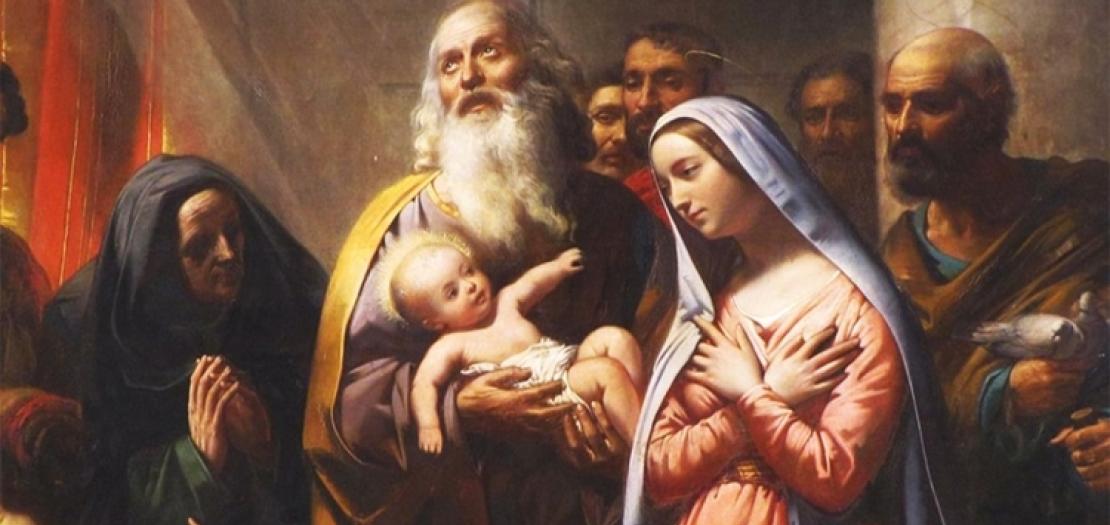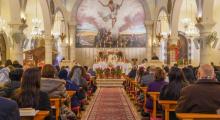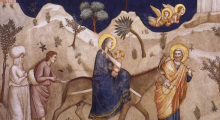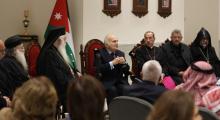Issued by the Catholic Center for Studies and Media - Jordan. Editor-in-chief Fr. Rif'at Bader - موقع أبونا abouna.org

Following is the text of the homily by His Beatitude Cardinal Pierbattista Pizzaballa, Latin Patriarch of Jerusalem, marking the Feast of the Presentation of Lord Jesus at the temple, dated February 2, 2024:
Dear Brothers and Sisters,
May the Lord give you peace,
Gathered by the Holy Spirit, in this beautiful celebration, like Simeon and Anna, we find ourselves in the house of God, to meet with Christ, and to bring back to Him our expectations, our desires, as well as our questions and our labors.
But we are here today, as religious men and women, to also give thanks and praise for the gift of vocation and faithfulness to the promises made 70, 60, 50, 10 years ago.
Also, on this occasion, I can express to each one of you together, my personal thanks and that of the entire Church of the Holy Land, for your valuable service of prayer, hospitality, social and educational apostolate; for the many gifts and charisms with which you enrich the Mother Church of Jerusalem. I have already reiterated many times, but I like to repeat it again, that the Church of the Holy Land, without you, would not only be incomplete, but it would also be poorer, because it would lack the great strength of love that through your service our Church manifests to the people of this Land, who are blessed and wounded, torn by so much hatred and divisions, but also rich in so much generosity.
Thank you, for what you do and what you are: a face of peace, closeness, mercy and care in our Church.
We are living through one of the most difficult times in recent history. We have already said and written this many times. And we struggle to behold, within the plots of this history, the providential presence of a merciful God, who acts, works, and changes the life of the world. Instead, we seem to be crushed by the events of this present violent time, which seems never-ending.
I would like for us to read today’s Gospel together from a lens that does not stop at the pain of this present moment, but rather goes beyond it, to help us reread the gift of religious vocation as the ability to live our personal and social history within a greater history, written by the “finger of God”.
Simeon was a man whose life was focused on waiting, by the Holy Spirit -which is, after all, the real protagonist of this Gospel passage- he spent his time waiting to see the consolation of Israel. Day after day, he lived waiting for that consolation, which never seemed to come: to see the One who would concretely fulfill this time of waiting, as in him, “the Messiah of the Lord,” (Luke 2:26) was his Consolation found.
Precisely because Simeon was able to experience that time of waiting well, he was also able to interpret it. Meaning, he was able to see in that child, the son of a poor young married couple, whom no one would ever notice, the long-awaited Consolation. He did not give in to the tragic events of his time, which even then were present. He did not give in to resignation to the harshness of that time. He did not stop believing that, in ways we would never expect, God was present and acting in the life of the world. He saw just within that hard time, the fulfillment of the promises of salvation. "The Holy Spirit was upon him" (Luke 2:25), "The Holy Spirit revealed to him," (Lukek 2:26) " He came in the Spirit into the temple.” (Luke 2:27)
He was able to listen to the Spirit, the voice of God, and read it within the simple and mysterious interwoven events of the anonymous story of a poor young married couple who went to the temple to fulfill the law. He will probably have been taken for a visionary, for someone who is out of touch with reality. In truth he was the prophet capable of seeing what the eyes of the flesh alone cannot see.
The lifestyle of old Simeon and the prophetess Anna, after all, presents well an aspect of our religious life: in the Holy Spirit, to know how to live everyday as the place within which consolation is already present, to be able to see in it, with the eyes of the Spirit, the redemption being accomplished, to bless God for the light with which he illuminates the world, and to be able to see it in the simple stories of everyday life.
Religious consecration, with its vows and rules, is nothing more than a public renunciation of living according to human rules of coexistence, in order to focus only on one's relationship with the "Messiah of the Lord" and nothing else. It is, in short, a way of proclaiming, with a life free from worldly ties, which is limited by time, that the Eternal is already present in this world of ours and in our lives, that we want to live by this certainty, and that we want to interpret today's events within this perspective, with our own view of history, illuminated by that Eternity that dwells in us. Like Simeon and Anna, therefore, we are not frightened by the evil that rages in this moment of history, by the tragic pain that seems to crush us, by the many forms of loneliness that accompany the men and women of this time. The consecrated man sees and shows the world the light that illuminates his gaze, which is the gaze of one who has seen consolation and redemption, and thus, day after day builds the Kingdom, with his work of prayer and service.
It is not a gaze divorced from reality. “Behold, this child is destined for the fall and rise of many in Israel, and to be a sign that will be contradicted- and you yourself a sword will pierce so that the thoughts of many hearts may be revealed.” (Luke. 2:34-35)
Simeon, then, was not a visionary; he was aware of the power of evil. But, even within that awareness, he was also able to see the Light that enlightens the nations, the Consolation that is fulfilled. Anna saw in Him, the redemption of Jerusalem. Even today, the signs of contradiction are present, just as there will be no shortage of swords, rejections, and difficulties of all kinds. However, the religious life, must also be, here and today, within this tragic history, a presence of consolation and redemption, of light and life.
Therefore, I would like that here and now, too, we, the religious should be able to have this gaze and to see the Light, which enlightens all the people here, to be able to see the redemption of Jerusalem, our beautiful and tormented Jerusalem. So let us not be stopped by the pain, the sword, which pierces us and the many contradictions, which afflict us. Our bending of knees in prayer and adoration; Our Humble service to the poverty of the people; your willing heart to heal the wounds and pain of the poor; Our willingness to stand by and support the young people who grow and study with us, is but a way of bringing into the lives of those people the Eternity that dwells there, and thus conveying a gaze that transcends the present pain, which brings consolation, and opens horizons of light and life.
Then, in the sea of hatred that has invaded us, may your lives be a testimony of a love that has been fulfilled; of patient care; of oil poured on the many wounds of this time and these peoples. In other words, may your testimony be a witness of consolation and salvation.
It is our way, the only way that we can be here in the Holy Land builders of peace and justice. For Christian justice is never separated from love.
Dearly beloved,
in reaffirming my thanks for your work and presence, I pray that you may be here, in our martyred Holy Land, a place of consolation and that you may help those you meet in your service to take an ever more open and free gaze on our history, with perspective open to the Eternal One who has pitched his tent in our midst.
† Pierbattista Card. Pizzaballa
Latin Patriarch of Jerusalem







